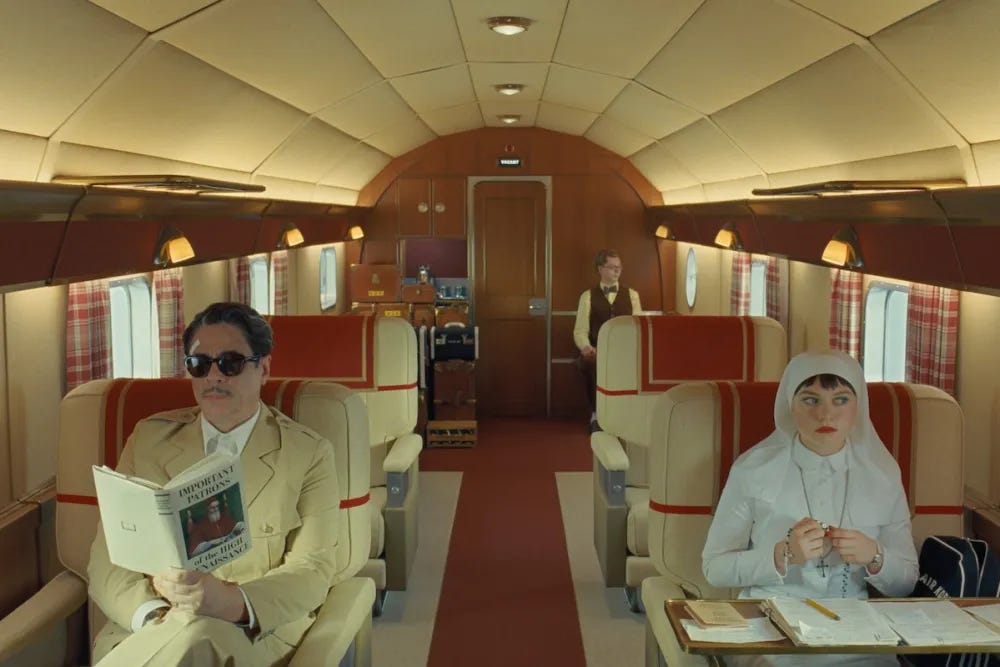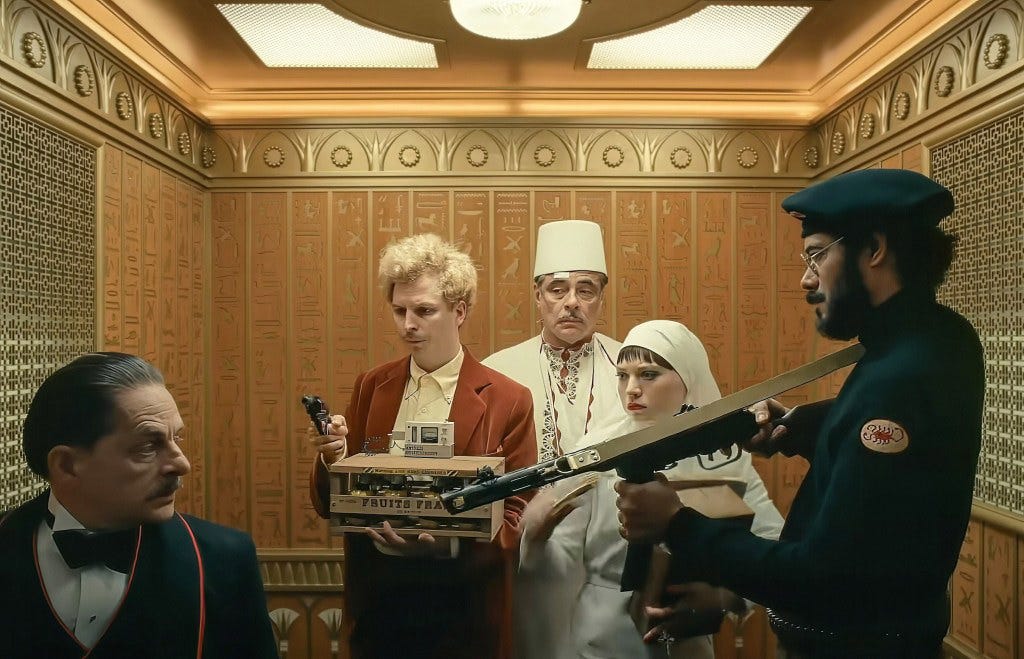'The Phoenician Scheme' Review
Director Wes Anderson's latest work is expectedly beautiful, funny, and sharp, if somewhat lacking emotionally.

An opinion I’ve seen making it’s rounds on the internet as of recent is that Wes Anderson is slowly becoming a parody of himself. Those aligning with this perspective claim that the director hasn’t done enough to shake up his formula and that as his now iconic style becomes more and more entrenched, that the man and his work is becoming a caricature of itself – all style and no substance. I would heartily disagree with this notion. Anderson is one of my personal favourite filmmakers, and has in the past decade, through his easily recognizable style, cemented himself as one of the premier auteurs of modern American cinema. Not everyone has seen every Wes Anderson movie, but when you go to the cinema and see the trailer for his latest outing, The Phoenician Scheme, even the person with he most basic of film tastes will be able to look at it and say “oh, a new Wes Anderson movie”. I would argue this is a good thing, that it’s fantastic that a filmmaker like Anderson has been able to not only find a unique style, but that said style has become an iconic and quintessential part of contemporary film and culture as a whole, whether it be in the form of SNL parody sketches or widespread Tik-Tok trends. Of course, these trends tend to only scratch the surface level aesthetics of Anderson’s work, failing to acknowledge how much of his success as a filmmaker not only comes from the style of it, but also the substance. I would describe Anderson’s best work as quietly devastating, tackling the personal, the political, and the existential. Films like The Royal Tenenbaums and The Life Aquatic with Steve Zissou are character focused drama-dies that never fail to punch me in the gut at the end, while Asteroid City tackled existential themes and ideas and was a film that I continue to think about almost 2 years after it released. The Grand Budapest Hotel balances excellent character writing with commentary on how seemingly quiet fascism can rise. With all this said, how does The Phoenician Scheme measure up with Anderson’s excellent filmography? In short; it’s not as good as those other films I mentioned. In long; keep reading.
The film follows controversial billionaire Zsa-Zsa Korda (Benicio del Toro) who, after surviving his *sixth plane crash/assassination attempt, decides to name his estranged nun-to-be daughter Liesl (Mia Threapleton) as his sole successor, though on a trial period until his has his affairs sorted. One of these affairs is his ambitious plan to overhaul the infrastructure of Phoenicia (historically an ancient Semitic people who inhabited the Mediterranean coast, in the film simply a name used for a vaguely Middle Eastern nation), through various incredibly expensive projects. The problem is that due to the fact that Korda is an amoral, shady businessman who has made many enemies around the world, and as such a consortium of influential leaders and businessmen, headed by Excalibur (Rupert Friend), have united to fix the price of many of the materials Korda needs to complete his projects. Thus, Korda must journey through Phoenicia, accompanied by Liesl as-well as Norwegian entomologist and personal tutor on insects Bjørn (Michael Cera), to convene with his various business partners, fixers, and investors to cover the missing money needed for the project. Hijinks, hilarity, and a journey of personal betterment ensue.
As I said before, Anderson’s best work is ‘quietly devastating’ – exuding an understated melancholy that carries through the entire runtime, eventually climaxing in a moment of revelation, a line that brings the entire thematic undercurrent of the film to the forefront. There is a bit of that here, but it lacks the emotional core that his other works do. There is a moment of revelation for Korda, but it just doesn’t hit the same. The central relationship, that between Korda and his daughter, is interesting and calls back to Anderson’s many other flawed father figures in his work, but their ultimate reconciliation and Korda’s personal redemption is feels somewhat rushed. In many ways his journey echoes that of Steve Zissou in The Life Aquatic, but where Zissou reaches it’s emotional climax as he finally finds the Leopard shark he had been searching for, leading to a beautiful scene of personal and emotional vulnerability, Korda never lets himself be vulnerable. His constant assertion that he feels ‘very safe’ despite the circumstances is funny, but perhaps the film should have had a moment where he realizes that he is lying to others and himself. His entire persona is a front masking a hurt child, but he never quite reaches that full emotional epiphany.
The film is perhaps, especially when compared to Anderson’s more recent output, one of the easiest of his films to grasp. There is depth below the surface, but not to the extent of other films, and the general ideas and themes that Anderson is exploring – those of familial trauma, colonialism and capitalism, and faith – are clear from very early. This isn’t inherently bad, but it left me feeling like I didn’t have more to explore and ponder after the film as I’d already gotten most of it, and I doubted that I would be thinking about the film much afterwards compared to a film like Asteroid City.
Where the film is strongest is essentially in every other aspect of it, showcasing Anderson and his collaborators, new and old, and the very top of their form. The film is, unsurprisingly, absolutely beautiful to look at, with new Wes Anderson collaborator (Anderson has previously worked with cinematographer Robert Yeoman on the majority of his projects) Bruno Delbonnel matching Anderson’s style wonderfully while also giving the film it’s own certain visual identity separate from the rest of Anderson’s filmography. Combined with Anderson’s other usual visual flairs - the intricately designed sets popping with colour - the film is an absolute visual treat.
Performances are also excellent all around. Del Toro, who had previously appeared in The French Dispatch, is wonderfully unlikable as Zsa Zsa, whilst maintaining and underlying sadness that permeates through the character. The scene stealer’s though are Michael Cera and Mia Threapleton, both of whom are first time collaborators with Anderson. Threapleton serves as the emotional anchor of the film, and she and Del Toro play off of each other excellently, imbuing their relationship with a quiet sadness. Cera, unsurprisingly, works wonders under Anderson, giving an incessantly funny performance that shifts throughout the film. I would be very happy to see both actors continue to work with Anderson on his projects in the future, as they fit into his vision wonderfully. Alongside these three are a menagerie of other performers, the majority of whom have worked with Anderson before, including Jeffery Wright, Tom Hanks, Scarlet Johansson, Benedict Cumberbatch, Mathieu Amalric, and Bryan Cranston, all of whom play the several investors into the Phoenician project whom Zsa Zsa must woo through the course of the film. Also starring in small roles are Riz Ahmed, Willem Dafoe, Rupert Friend, Hope Davis, Richard Ayoade, and of course Wes Anderson favourite Bill Murray, who this time around has the very small role of God. While most of the actors only have small roles, they all ensure that their impact is felt, with Hanks, Cranston, Wright, and Cumberbatch in particular standing out with some insanely funny performances.
As a whole, the film is incredibly funny, perhaps one of Anderson’s funniest to date. The expected dry delivery of his actors contrasting well with the wacky shenanigans they find themselves in, and random moments of gory, over-the-top violence, including two occasions in which the top halves of people are blown to shreds, serve to shock and humour to the same degree.
To an extent it is true that Wes Anderson is becoming predictable. He has found a style he loves to play with and uses it to tell stories which can make one laugh, ponder, and despair. While it could perhaps be interesting to see the filmmaker someday try something completely new and throw everyone for a loop, I can’t say I don’t ever enjoy his style. As a filmmaker, he exists in a world where true authorship and vision is becoming more and more rare, and so it is fantastic to see a filmmaker like him who has made such a cultural impact with his style – a style that is wholly his and no one else’s. The Phoenecian Scheme is another example of him further refining this style, exploring new ideas alongside some he has already dipped his toes into. Stylistically it is some of his best work, but thematically it is, while certainly sharp, somewhat emotionally shallow where his best work is far more poignant. It is ultimately lesser Wes Anderson, but lesser Wes Anderson is still very, very good.






